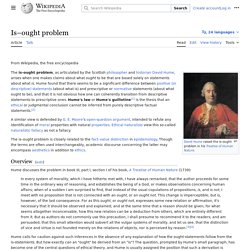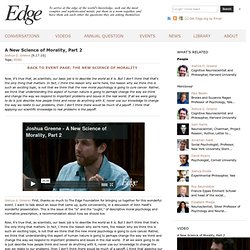

Is–ought problem - Wikipedia. The is–ought problem, as articulated by Scottish philosopher and historian David Hume (1711–76), states that many writers make claims about what ought to be on the basis of statements about what is.

Hume found that there seems to be a significant difference between positive statements (about what is) and prescriptive or normative statements (about what ought to be), and that it is not obvious how one can coherently move from descriptive statements to prescriptive ones. The is–ought problem is also known as Hume's law, or Hume's guillotine. A similar view is defended by G. E. Moore's open-question argument, intended to refute any identification of moral properties with natural properties. Overview[edit] Hume discusses the problem in book III, part I, section I of his book, A Treatise of Human Nature (1739): Hume asks, given knowledge of the way the universe is, in what sense can we say it ought to be different? Implications[edit] Responses[edit] Oughts and goals[edit] Discourse ethics[edit] How (and where) does moral judgment work?
Greene. Joshua d.

Greene: First, thanks so much to The Edge Foundation for bringing us together for this wonderful event. I want to talk about an issue that came up, quite conveniently, in a discussion of John Haidt's wonderful presentation. This is the issue of the "is" and the "ought," of descriptive moral psychology and normative prescription, a recommendation about how we should live. The Cognitive Neuroscience of Moral Judgement. Moral Cognition Lab.
Publications Forthcoming Book Greene is currently writing a book (Forthcoming, Penguin Press) about the moral and social implications of our emerging scientific understanding of morality. Journal Articles Shenhav, A.S., Greene, J.D. (in prep). Utilitarian calculations, emotional assessments, and integrative moral judgments: Dissociating neural systems underlying moral judgment. Killingsworth, M.A., Stewart, L.E., Greene, J.D. Wagner Götterdämmerung - Siegfried's death and Funeral march Klaus Tennstedt London Philharmonic.